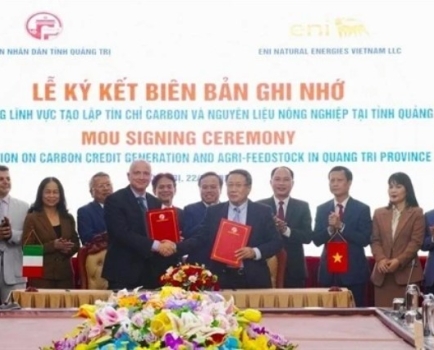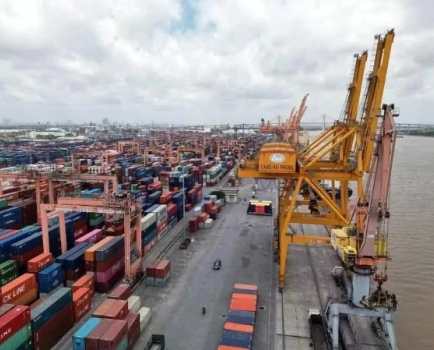Removing Difficulties for S&T Enterprises
Mon, 20 Jan 2025 13:35:00 | Print | Email Share:
Vietnam's Party and State prioritize science and technology (S&T) as a key national policy, fostering development through supportive mechanisms and policies. Nghe An province aligns with this policy, promoting startups, attracting top talent and strengthening connections with domestic and international science and technology organizations.
The Department of Science and Technology of Nghe An province prioritizes establishing a strong system of mechanisms and policies, providing a solid legal foundation to enhance operational efficiency and contribute to the province's socio-economic development. Notable policies include Resolution 19/2023/NQ-HDND dated December 7, 2023, which specifies state budget expenditure levels for many S&T activities, and Resolution 74/NQ-HDND dated December 7, 2023, which defines the list of public service activities funded by the state budget in the S&T sector.
Nghe An province has implemented policies supporting agricultural and rural development for 2022–2025 across 12 districts and towns, with a total budget of VND5 billion, enhancing food safety and agricultural production. Resolution 39-NQ/TW, issued by the Politburo on July 18, 2023, outlines a vision for Nghe An’s growth until 2030 and 2045, positioning the province as a hub for startups, high-quality talent and global S&T cooperation.
Vietnam currently has around 2 million registered enterprises, with about 1 million actively operating. However, only over 800 of the 3,000 eligible enterprises have been certified as S&T enterprises - a figure that remains modest compared to the rapidly growing business community and the Government's targets. To encourage the adoption of S&T, the Government issued Decree 13/2019/ND-CP in February 2019, offering incentives such as corporate income tax exemptions, reductions, and credit support.
On May 11, 2022, the Prime Minister issued the Strategy for Science, Technology, and Innovation Development until 2030, emphasizing its role as a breakthrough for the next decade, driving innovation, enhancing productivity, quality, efficiency and economic competitiveness.
Despite progress, the development of S&T enterprises in Vietnam still faces many difficulties in terms of quantity, quality and legal barriers. This calls for greater State attention to policies, legal frameworks, resources, and startup orientation to foster growth in this sector.
Difficulties of S&T enterprises
Nghe An currently has 15 operating S&T enterprises - a modest figure compared to over 15,000 businesses in the province and more than 800,000 nationwide. These enterprises face many difficulties, including limited access to financial resources for technology investment, difficulties in recruiting high-level talent, accessing land and expanding product markets. Some businesses do not prioritize S&T as a core foundation for their operations.
Vinh Hoa Science and Technology Co., Ltd. specializes in researching new rice varieties, developing cultivation processes, producing and trading high-quality rice, and contracting to process new rice products. According to Director Phan Van Hoa, difficulties such as machinery, technology, marketing, management capacity, and especially capital remain significant hurdles, not only for his company but for most S&T enterprises. He emphasized the need for Nghe An province to implement supportive financial policies and mechanisms to help these enterprises advance their research, application, and development, thereby creating valuable products for society. “While some state support and incentives are available, the complicated procedures for accessing funds and preferential policies deter many businesses from pursuing S&T enterprise status, which is already limited in Nghe An,” he said.
Mr. Nguyen Danh Nhan, Director of Central Agricultural Joint Stock Company, a S&T enterprise specializing in seed processing for propagation, highlighted that small and medium enterprises still struggle with many administrative hurdles, such as sub-licenses and the attitudes of some government officials. He said that accessing land involves excessive procedures. Regarding capital, enterprises often rely on loans from commercial banks, using personal assets as collateral, as they cannot access funding from policy banks.
A representative of Pu Mat Medicinal Joint Stock Company, assessing the company's difficulties, emphasized that the biggest difficulties are land and capital. The company requires land for experimentation, research, seed production, and factory construction to produce products from scientific research. Despite the government's efforts, enterprises like theirs are unable to secure loans due to a lack of available capital. The representative stressed the need for specific state policies on land rental and loan access, including priority policies for S&T enterprises to participate in Ministry-level programs and technology transfer activities.
Solutions and recommendations
The Ministry of Science and Technology is currently proposing an amendment to the Law on Science and Technology, with plans to submit it to the Government and National Assembly this year. The proposed changes aim to introduce new, groundbreaking provisions that will transform the law into an effective tool and legal framework to significantly promote science, technology, and innovation. These amendments are expected to serve as a foundation for the formation and growth of enterprises in this sector.
Before the new Law on Science and Technology is enacted, many S&T enterprises have proposed several solutions and recommendations based on practical experience and the difficulties they face:
First, continue to refine mechanisms and policies to ensure synchronization and effectiveness. Simplify administrative procedures for granting S&T enterprise certificates and remove bottlenecks, ensuring timely access to state support and preferential policies. Facilitate access to preferential loans for research projects and technology innovation from the National Science and Technology Development Fund and the National Technology Innovation Fund.
Second, collaborate with Vietnam Chamber of Commerce and Industry (VCCI) and business associations to organize dialogues to address difficulties. Strengthen efforts to disseminate the Party and State's guidelines and policies to foster creative entrepreneurship and the application of S&T in production and business.
Third, increase awareness among party committees and authorities at all levels about the importance of S&T as a top national policy, in line with the Party's Resolutions. Strengthen the role and responsibility of agencies in creating favorable management mechanisms that encourage investment in science, technology and innovation.
Finally, the Department of Science and Technology of Nghe An should focus on helping S&T enterprises adopt advanced technology to improve productivity, quality and competitiveness, develop markets, and secure product output, thereby contributing to the province’s socio-economic development.
By: Phan Duy Hung, VCCI Branch for Nghe An – Ha Tinh – Quang Binh, Vietnam Business Forum
Source: https://vccinews.com/news/59960/removing-difficulties-for-s-t-enterprises.html
---------------------------------------------
Same category News :













